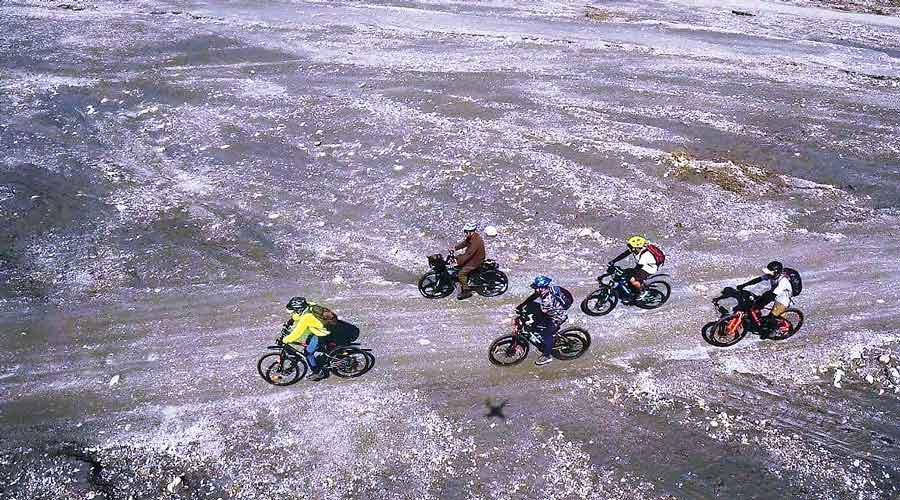A senior official of the state forest department, posted in north Bengal, is pedalling across the wildlife corridor of the region with four others since February 4 to create awareness on man-animal conflict.
Ujjal Ghosh, the additional principal chief conservator of forests of north Bengal, started his expedition from the Mahananda Wildlife Sanctuary on the outskirts of Siliguri, and intends to cover 350km, that is, the entire Dooars region till Sankosh, the river that marks the interstate border of Bengal and Assam.
Atanu Bhattacharya, an oncologist, and three members of the Siliguri-based Himalayan Nature and Adventure Foundation — Debjyoti Dey, Rupajit Dutta and Suprit Saha — are Ghosh’s riding companions.
“We are moving on the wildlife corridor. On the way, we are stopping in villages, meeting villagers to make them aware of how they can avoid man-animal conflict, conserve wildlife and nature. We are also telling how they can contribute to increase the green cover in north Bengal,” said Ghosh.
Tips to people include asking them to stay calm and call up foresters immediately instead of threatening the animal. Villagers are also being asked to not fell trees as depleting green cover causes wild animals to venture out into human habitats.
In north Bengal, man-animal conflict is often reported. In most of cases, elephants, leopards and gaurs (Indian bison) enter villages, damage crops and houses and in some cases attack people. In recent times, Himalayan black bears straying into human habitation have been reported.
“Many times, wild animals also lose their lives. That is why awareness is necessary on how villagers should respond to such situations and also how the forest staff can mitigate such conflicts and handle such situations,” said a forest official.
On February 4, the team moved through the forests of Mahananda, Baikunthapur and Jalpaiguri forest divisions. On the next day, they reached Banarhat in Dooars, covering forests like Reti, Bandapani and parts of Jaldapara National Park.
On Monday, the team reached the Buxa Tiger Reserve area. On Tuesday, the members of the expedition will pedal further and reach the Bengal-Assam border.
The five-member team is also stopping at different forest beat offices and range offices to speak with the forest staff posted in these places.
“The initiative is likely to benefit the forest staff and residents who stay in villages near the wildlife corridor, as the additional PCCF is reaching out to them,” the officer added.










